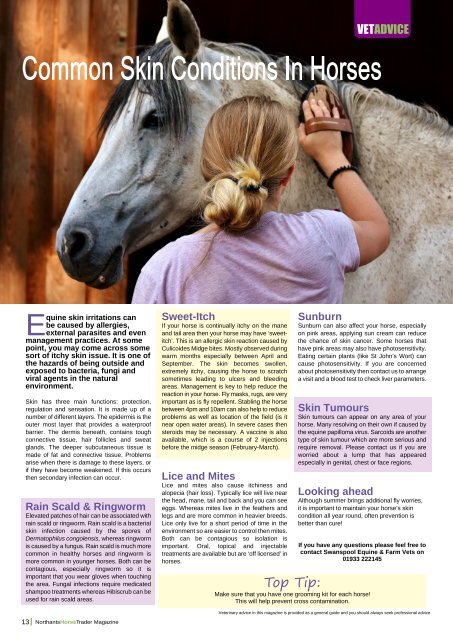NHT Magazine Summer 2019
Create successful ePaper yourself
Turn your PDF publications into a flip-book with our unique Google optimized e-Paper software.
VETADVICE<br />
Equine skin irritations can<br />
be caused by allergies,<br />
external parasites and even<br />
management practices. At some<br />
point, you may come across some<br />
sort of itchy skin issue. It is one of<br />
the hazards of being outside and<br />
exposed to bacteria, fungi and<br />
viral agents in the natural<br />
environment.<br />
Skin has three main functions: protection,<br />
regulation and sensation. It is made up of a<br />
number of different layers. The epidermis is the<br />
outer most layer that provides a waterproof<br />
barrier. The dermis beneath, contains tough<br />
connective tissue, hair follicles and sweat<br />
glands. The deeper subcutaneous tissue is<br />
made of fat and connective tissue. Problems<br />
arise when there is damage to these layers, or<br />
if they have become weakened. If this occurs<br />
then secondary infection can occur.<br />
Rain Scald & Ringworm<br />
Elevated patches of hair can be associated with<br />
rain scald or ringworm. Rain scald is a bacterial<br />
skin infection caused by the spores of<br />
Dermatophilus congolensis, whereas ringworm<br />
is caused by a fungus. Rain scald is much more<br />
common in healthy horses and ringworm is<br />
more common in younger horses. Both can be<br />
contagious, especially ringworm so it is<br />
important that you wear gloves when touching<br />
the area. Fungal infections require medicated<br />
shampoo treatments whereas Hibiscrub can be<br />
used for rain scald areas.<br />
Sweet-Itch<br />
If your horse is continually itchy on the mane<br />
and tail area then your horse may have ‘sweetitch’.<br />
This is an allergic skin reaction caused by<br />
Culicoides Midge bites. Mostly observed during<br />
warm months especially between April and<br />
September. The skin becomes swollen,<br />
extremely itchy, causing the horse to scratch<br />
sometimes leading to ulcers and bleeding<br />
areas. Management is key to help reduce the<br />
reaction in your horse. Fly masks, rugs, are very<br />
important as is fly repellent. Stabling the horse<br />
between 4pm and 10am can also help to reduce<br />
problems as well as location of the field (is it<br />
near open water areas). In severe cases then<br />
steroids may be necessary. A vaccine is also<br />
available, which is a course of 2 injections<br />
before the midge season (February-March).<br />
Lice and Mites<br />
Lice and mites also cause itchiness and<br />
alopecia (hair loss). Typically lice will live near<br />
the head, mane, tail and back and you can see<br />
eggs. Whereas mites live in the feathers and<br />
legs and are more common in heavier breeds.<br />
Lice only live for a short period of time in the<br />
environment so are easier to control then mites.<br />
Both can be contagious so isolation is<br />
important. Oral, topical and injectable<br />
treatments are available but are ‘off licensed’ in<br />
horses.<br />
Sunburn<br />
Sunburn can also affect your horse, especially<br />
on pink areas, applying sun cream can reduce<br />
the chance of skin cancer. Some horses that<br />
have pink areas may also have photosensitivity.<br />
Eating certain plants (like St John’s Wort) can<br />
cause photosensitivity. If you are concerned<br />
about photosensitivity then contact us to arrange<br />
a visit and a blood test to check liver parameters.<br />
Skin Tumours<br />
Skin tumours can appear on any area of your<br />
horse. Many resolving on their own if caused by<br />
the equine papilloma virus. Sarcoids are another<br />
type of skin tumour which are more serious and<br />
require removal. Please contact us if you are<br />
worried about a lump that has appeared<br />
especially in genital, chest or face regions.<br />
Looking ahead<br />
Although summer brings additional fly worries,<br />
it is important to maintain your horse’s skin<br />
condition all year round, often prevention is<br />
better than cure!<br />
If you have any questions please feel free to<br />
contact Swanspool Equine & Farm Vets on<br />
01933 222145<br />
Top Tip:<br />
Make sure that you have one grooming kit for each horse!<br />
This will help prevent cross contamination.<br />
Veterinary advice in this magazine is provided as a general guide and you should always seek professional advice.<br />
13 NorthantsHorseTrader <strong>Magazine</strong>















